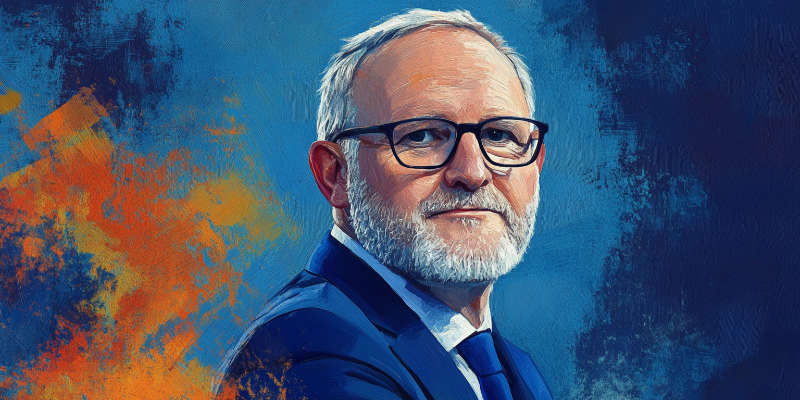Green Deal Frans Timmmermans: Double Standards and Pseudo-Democrat

Frans Timmermans, long presented as the face of the European climate transition, served as the Executive Vice-President of the European Commission, responsible for the European Green Deal — an ambitious plan to make Europe the first climate-neutral continent by 2050 (European Green Deal Overview, European Commission, 2019). Timmermans spoke of a “green future” where economic growth and environmental protection would go hand in hand.
The message was clear: the European Green Deal would save the climate while strengthening the European economy. But while Timmermans publicly called for radical greening and solidarity, it became increasingly clear that the burden of this transition was being placed primarily on ordinary citizens, while large corporations and financial institutions reaped the benefits.
Political background and rise in the Netherlands
Frans Timmermans was born in 1961 in the Dutch city of Maastricht and began his political career as a diplomat. He joined the Dutch Ministry of Foreign Affairs in 1990 and quickly became a significant figure in Dutch politics. His rise in politics was characterized by his strong focus on Europe and multilateralism. In 2007, he became Minister of Foreign Affairs in the Netherlands, a position he held until 2010.
During his time as minister, Timmermans frequently defended the interests of the EU on the global stage. His tough stance toward Russia and his calls for deeper European integration made him popular within the European establishment, which ultimately led to his appointment as Vice-President of the European Commission in 2014.
Early political controversies
Although Timmermans was often praised for his commitment to European cooperation, early signs of controversial behavior and doubts about his integrity were already apparent. One of the first major controversies that affected him in the Netherlands was his role in approving the EU deal with Ukraine, despite significant opposition from the Dutch population in a referendum.
The Ukraine deal and EU democracy
In 2016, the outcome of the Dutch referendum on the EU-Ukraine Association Agreement led to widespread outrage in Dutch politics. The deal was rejected by 61% of voters, but Timmermans and his political colleagues in the EU ignored the will of the people. Instead, they pushed Dutch lawmakers to override the result, leading to accusations of undermining democracy. Timmermans’ support for the deal despite the negative public vote was seen by critics as a symbol of his disregard for the sovereignty of member states and their democratic processes.
His role in the refugee policy
Timmermans was also heavily criticized for his role in the 2015 European refugee crisis, where he advocated for the redistribution of refugees among EU member states without much regard for the practical consequences for the countries receiving the largest number of refugees. His support for the mandatory quota system sparked heated debates and put him at odds with countries such as Poland, Hungary, and the Czech Republic, which refused to implement the system. This division underscored the tension between the “Brussels elite” and countries that felt abandoned by the European Commission (EU and the Migrant Crisis, De Volkskrant).
The beneficiaries of the Green Deal
Financial institutions as big winners, citizens as losers
Banks and investment funds have now flocked to the ‘green’ market. Financial institutions such as BlackRock manage billions in green funds and green bonds, profiting from the subsidies and tax advantages offered by the EU (Sustainable Investing Report, BlackRock, 2020). The financial sector profits from the climate “crisis” while households face rising energy prices and higher taxes.
Timmermans was fully aware of this dynamic. Yet, he continued to repeat the narrative of a fair green transition, even though he was the architect of a system where financial interests were prioritized over the common good.
Land expropriation and rising food prices
The nitrogen policy and the agricultural crisis
One of the most controversial aspects of the EU’s climate policy under Timmermans was the nitrogen policy, which led to strict restrictions on the agricultural sector. Dutch farmers faced forced buyouts of their farms to reduce nitrogen emissions — while large industrial polluters were largely left untouched (State of the Environment Report, European Environment Agency, 2021).
In the Netherlands, the nitrogen policy was marketed as a necessary measure to protect nature. But the result was that farming families lost their businesses, while property developers and major infrastructure projects were able to proceed thanks to legal exemptions (Nitrogen Policy and Its Consequences for Agriculture, Klaassen, 2022). The nitrogen crisis thus became a tool to free up land for construction projects rather than a genuine effort to protect the environment.
Honorary doctorate linked to EU subsidies
Conflict of interest with universities
In January 2020, Timmermans came under fire when it was revealed that he had received an honorary doctorate from the Delft University of Technology shortly after the institution had received nearly €1 million in EU funding for environmental research.
According to Brussels Signal, this led to criticism about potential conflicts of interest and the use of financial incentives to secure academic recognition (Focus Moves on to Timmermans’ Honorary Degrees After Shadow Lobbying Scandal, Brussels Signal).
Subsidized lobbying practices
One of the most shocking revelations about Timmermans emerged in early 2025 when it was revealed that the European Commission under his leadership had funded environmental NGOs to lobby for the European Green Deal.
EU money for political influence
According to De Telegraaf, this included a €700,000 contract awarded to an environmental group to steer the debate on agriculture and environmental policy in a “green” direction (EU Paid Environmental Groups for Lobbying, De Telegraaf). This raises ethical questions about the use of taxpayers’ money for political influence, where Timmermans effectively used European citizens’ money to buy support for his own policy agenda.
The privileged Timmermans
Financial benefits as EU Commissioner
Frans Timmermans presents himself as a champion of economic equality and social justice, but his personal financial situation tells a different story. As Executive Vice-President of the European Commission, he enjoyed a generous salary well above the average European citizen. In 2021, an EU Commissioner earned a base salary of approximately €25,000 per month, excluding allowances and reimbursements (Salaries and Benefits of EU Officials, European Commission, 2021).
Moreover, Timmermans was entitled to tax-free allowances for housing, representation, and other work-related expenses, benefits unimaginable for ordinary citizens. A significant portion of EU officials’ income is taxed under the EU’s favorable internal tax regime, which is typically lower than the national tax rates in most member states.
This meant that Timmermans was largely exempt from national income tax while simultaneously advocating for higher taxes on citizens to cover the costs of climate policy. This discrepancy raises questions about the credibility of his message of economic equality.
Climate hypocrisy
Private jets and luxury travel
Timmermans positioned himself as the face of Europe’s fight against climate change. He called on citizens to consume less, fly less, and reduce their ecological footprint.
According to The Guardian, he himself regularly used private jets for official travel, despite the availability of efficient train connections and commercial flights (Timmermans Uses Private Jets Despite Calls for Climate Responsibility, The Guardian).
In 2021, The Guardian reported that Timmermans frequently used private jets to attend European summits and climate conferences, while urging citizens to fly less to reduce CO₂ emissions. This behavior not only undermines his credibility as a climate leader but reinforces the perception that the EU establishment applies one set of rules for citizens and another for itself.
Double standards
After his departure from the European Commission in 2023, Timmermans continues to enjoy a generous pension, funded by European taxpayers. Former EU commissioners are entitled to a pension based on their years of service and salary level, with a maximum pension amount that can reach up to 70% of their last earned salary (Pension entitlements for EU officials, European Court of Auditors, 2022). This means that Timmermans is estimated to be entitled to a pension of around €175,000 per year — an amount financed by the EU budget, meaning by European taxpayers.
This financial security contrasts sharply with the increasing financial pressure faced by ordinary citizens as a result of EU climate policy. The policies surrounding carbon pricing, higher energy taxes, and stricter environmental regulations have led to rising energy costs and higher expenses for households (Energy prices and market stability in Europe, International Energy Agency, 2022). While Timmermans speaks of solidarity and a fair distribution of the costs of the climate transition, he himself remains financially protected through his position as a former EU official. This reinforces the classic pattern of “rules for the people, exceptions for the elite.”
Current role
After leaving Brussels, Timmermans re-emerged as a champion of sustainability and social justice. As the lead candidate for GroenLinks-PvdA in the Netherlands, he maintained the same rhetoric about solidarity and the green transition. During the election campaign, he spoke about the need for stricter environmental regulations, higher taxes on CO2 emissions, and more investments in renewable energy — measures that would once again primarily be borne by citizens and small to medium-sized businesses (Verkiezingsprogramma GroenLinks-PvdA, GroenLinks-PvdA, 2023).
At the same time, Timmermans himself remains financially unaffected by these measures. His pension and previous financial benefits as an EU commissioner ensure his personal financial security, regardless of the economic impact of climate policies on the rest of the population. While citizens face rising energy bills and higher costs for everyday necessities, Timmermans continues to advocate for more financial sacrifices in the name of the green transition.
During the election debate in the Netherlands, Timmermans accused opponents of “climate denial” and “social selfishness” — a strategy that sharpened the political debate and placed his opponents in a morally defensive position. At the same time, he supported a system for years in which large corporations and financial institutions profited from emissions trading and subsidies, while the financial burden fell on citizens and smaller businesses (Rare Earth Mining and Environmental Impact, Behrens et al., 2019). The gap between his words and actions remains clear.
Conclusion
Timmermans’ climate policy was not an attempt to save the planet — it was a strategic move to expand political and economic control. The burden of the transition is borne by citizens and farmers, while financial institutions and multinationals are recording record profits. The European Green Deal has not created a green future — it has concentrated power in the hands of a select group of policymakers and corporations.
The core of Timmermans’ hypocrisy lies in the contrast between his public values and his personal behavior. While he called on citizens to show solidarity, make economic sacrifices, and comply with stricter environmental rules, he himself continued to benefit from tax advantages, financial privileges, and political recognition. His call for a “fair distribution of the burden” in practice applies mainly to ordinary citizens, while he himself remains untouched. The use of private jets, the acceptance of an honorary doctorate following EU subsidies, and the financing of lobbying groups with taxpayer money all show that Timmermans’ policies primarily served to strengthen his own position, not to promote fairness or equality. His political choices have led to higher costs for households, while large companies and financial institutions benefit from subsidies and tax advantages. The question remains: who really benefits from Timmermans’ climate policy? The answer seems clear — not the citizens he claims to protect, but the financial and industrial elites.


















